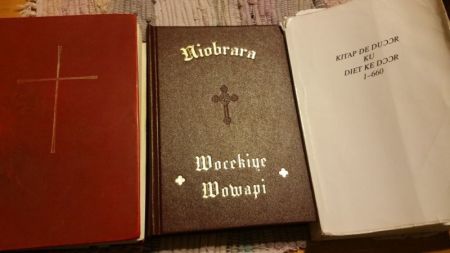Episcopal Church Donates $45K for Prayer Book Translation in Native American Heart Language

The Episcopal Church has approved a project to translate the Book of Common Prayer into the Native American language of Lakota.
The Episcopal Diocese of South Dakota recently received a United Thank Offering grant of $45,000 to translate the BCP into contemporary Lakota.
Archdeacon Paul Sneve of the South Dakota Diocese told The Christian Post in an interview on Tuesday that they were in the beginning stages of the translation project.
"Episcopal Congregants from our nine reservations are submitting names of fluent speakers [and] writers who are also familiar with the English BCP. We have decisions to make especially in regard to how best to accommodate the three dialects spoken here, as well as what to include in book," explained Sneve.
"It has become evident early on that the finished book will be different than the English BCP in that we have liturgies that we use that aren't included in the 1979 book."
The $45,000 grant will be used to fund the work of the Translation and Editorial Committees, Formatting, as well as the printer preparation work and the eventual printing.
Before receiving the UTO grant, the diocese had been gradually translating parts of the BCP, yet they were unable to oversee a concentrated effort to make a BCP containing materials that were consistently translated.
"We do have a Niobrara Service Book that replaced the 1891 Wocekiye Wowapi Kin (The Prayer Book), but it is only in Dakota (not Lakota or Nakota) and is an older form of Lakota," Sneve noted.
"Our new book will be in a more contemporary form of Lakota. We also have our Dakota Hymnal and a Dakota Translation of the Bible."
Greg Pruett, president of the Dallas, Texas-based Pioneer Bible Translators, spoke positively to CP about projects like the diocese's work on the Lakota language BCP.
"We encourage projects that promote the use of Scripture in the heart language of people. God's Word has the power to transform lives," said Pruett.
Pruett directed CP to a Forum of Bible Agencies International document on "Basic Principles and Procedures for Bible Translation," which noted important goals when translating scripture.
These goals included an agreement to "translate the Scriptures accurately," "communicate ... the feelings and attitudes of the original text," "preserve the variety of the original," and "make every effort to ensure that no political, ideological, social, cultural, or theological agenda is allowed to distort the translation."
While the South Dakota Diocese does not have an official deadline for their translation project, Sneve told CP that they hope to complete it within the next two to three years.





















